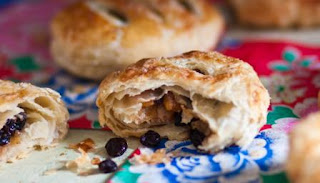BECOMING CULTURE - HOLIDAY CELEBRATIONS
 |
| http://www.bbc.co.uk/food/recipes/eccles_cakes_75687 |
I stumbled upon an interesting food article in the Northamptonshire Telegraph online . The article is a ‘how to’ for using left over hard sauce
after the holidays and speaks of a recipe that I have never heard of called
Eccles cakes. Apparently, Eccles cakes
were a decadent cake that used butter and sugar that were outlawed in the late
1600’s – early 1700’s by Oliver Cromwell who believed that the cakes were so
good that they must be a sin. Cromwell
had been a soldier, politician, and devout religious figure in England, “Cromwell
sought 'Godly reformation', a broad programme involving reform of the most
inhumane elements of the legal, judicial and social systems and clamped down on
drunkenness, immorality and other sinful activities” (Cromwell Association,
2005). His memorial statue is in place
at Parliament square, where service is held annually on September 3rd,
Cromwell Day.
An aspect of culture and society, which holds a special
place in my heart, is local cuisine and the stories they hold. When traveling abroad or to regions of the
US, I always try to find some local foods or brews to try (…‘if I wanted a
burger, I can get one at home’ is my usual saying when on vacation). When I came across this article in the Telegraph, it was the perfect opportunity
for me to do a little research on the history of the cakes and Oliver
Cromwell. In doing so, I discovered that
Cromwell was a supporter of the religious rights of Protestants in England. My personal connection to this story is that
my ancestors were Protestants that fled England in the early 1600’s in search of
religious freedom.
Link to history of Eccles cakes - http://www.ecclescakes.com/History.html
Link to Eccles cakes recipe - http://www.bbc.co.uk/food/recipes/eccles_cakes_75687
Hard sauce has its origins in the 1700’s when it was used as
an icing to pastries, cakes, and puddings.
Hard sauce is
a sweet, rich dessert sauce made by creaming or beating butter and sugar with
rum (rum butter), brandy (brandy butter), whiskey, sherry (sherry butter), vanilla,
or other flavorings. It is served cold,
often with hot desserts.
It is
typically served with plum pudding, bread pudding, Indian pudding, hasty
pudding, and other heavy puddings as well as with fruitcakes and gingerbread.
In the U.K.,
it is particularly associated with the Christmas and New Year season and
Christmas pudding and warm mince pies, serving as a seasonal alternative to
cream, ice cream or custard. At Cambridge, it is also known as Senior Wrangler
sauce.
Though it is
called a sauce, it is neither a liquid nor smooth. It could be more accurately
classified as a spread and has the consistency of butter. It is easy to make
and keeps for months under refrigeration. It can be pressed into a decorative
mold before chilling (Black, 2005).
Link to recipe for brandy butter - http://www.bbc.co.uk/food/recipes/brandybutter_2535
References
- Black, William. (2005). The Land that Thyme Forgot. Bantam
- Cromwell Association Online. Retrieved 20 February 2013 from http://www.olivercromwell.org/cromwell_and_religion.htm
- Kimbell, Vanessa. (30 Jan. 2013). Eccles cakes. Northamptonshire Telegraph. Retrieved from http://www.northantstelegraph.co.uk/lifestyle/food-drink/recipe-of-the-week-eccles-cakes-1-4736740
HAPPY EATING!

Comments
Post a Comment